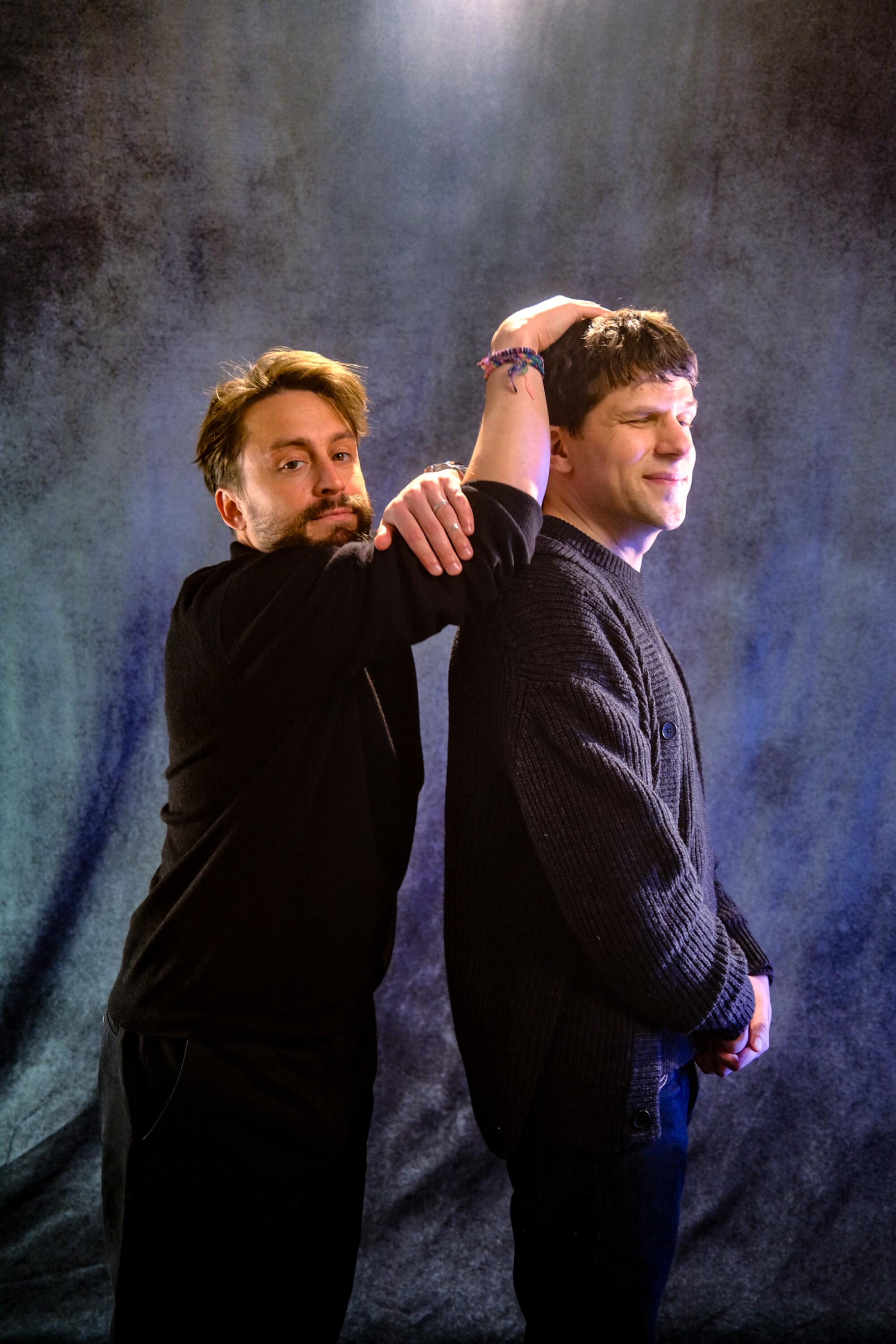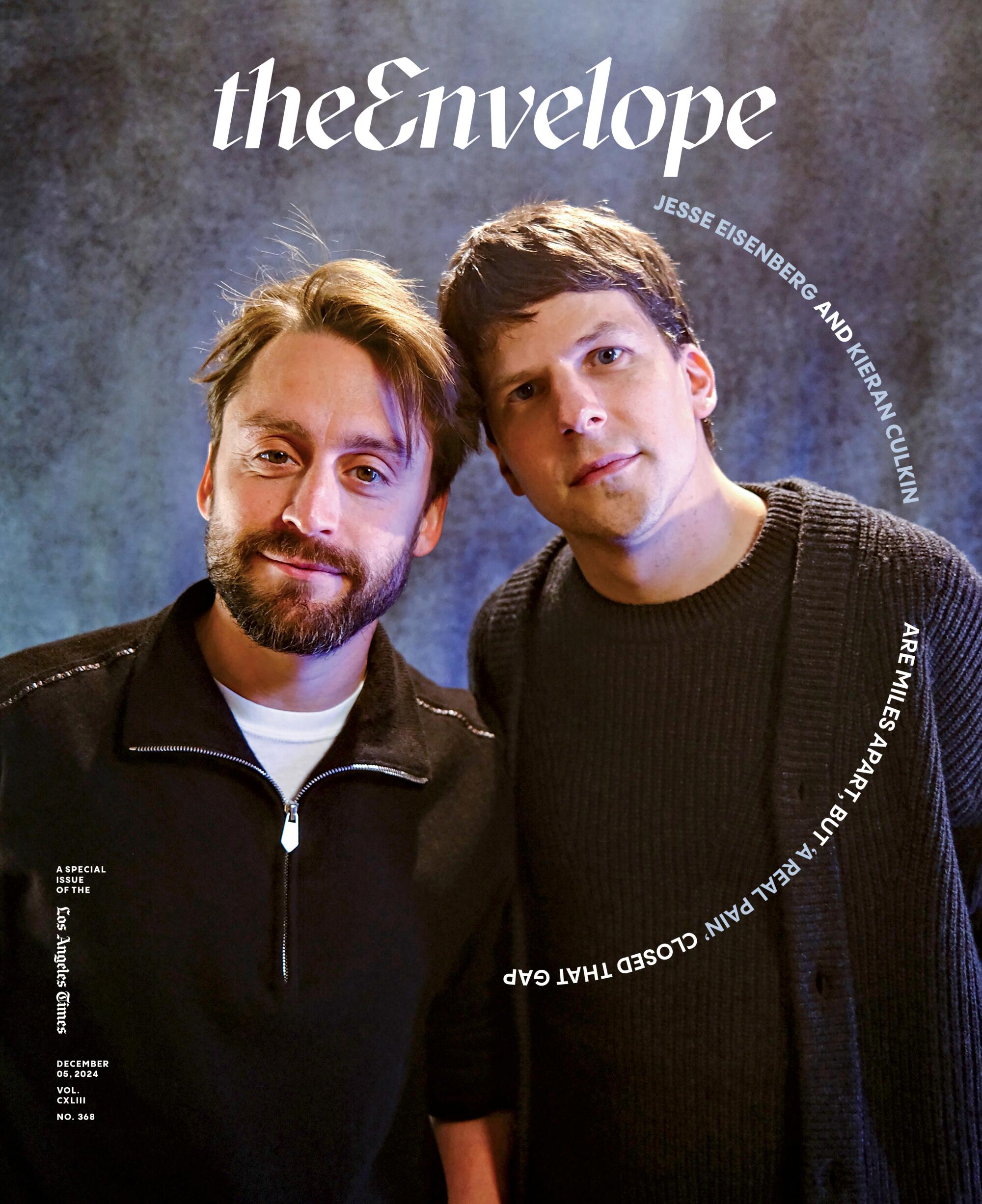Kieran Culkin tells a narrative about desperately not desirous to go to Poland to make Jesse Eisenberg’s odd-couple highway film, “A Real Pain,” and, whereas each phrase of it’s true and comes from a deep place in his soul, tied to the love he has for his spouse and kids, it nonetheless seems like a little bit of salesmanship for the movie.
“The upshot of it is, this movie was so absolutely perfect that I couldn’t say no to it,” I inform Culkin, paraphrasing his pitch. “Like, if it had even one small imperfection, I would have bailed. But no. It was flawless.”
“It’s honestly the truth, and it was disappointing to my wife,” Culkin says. “You should have seen her face fall when I said, ‘I’m going to the other room to read it again. And this time I am going to read it with the perspective of really trying to find holes and really trying to find a reason to go, ‘Actually, this isn’t as good as I thought it was.’
“She apparently was hearing me laughing from the other room and was like, ‘Oh s—, this isn’t going so well,’” Culkin continues. “She really didn’t want to go on this trip, either. And when I walked into the room, I just went, ‘I’m sorry, honey.’”
Eisenberg, the author, director and co-star of “A Real Pain,” is sitting subsequent to Culkin. Within the film, they play cousins who journey to Poland to go to the childhood residence of their beloved late grandmother, a Holocaust survivor. Eisenberg forged himself because the tightly wound introvert and Culkin because the charmer whose exuberance masks a deep internal turmoil.
“Ninety-seven percent of Screen Actors Guild actors are not working,” Eisenberg says to Culkin, “and you’re like, ‘I’m sorry, honey. I have to go make a movie I’m starring in.’”
Did you’ve got any concept that he was wavering?
“What I was doing while he was doing that was shot-listing, buying wardrobe, figuring out and confirming locations and sets,” Eisenberg continues. “To say we were knee-deep in production is an understatement. Two weeks before a movie shoots, you’re kind of shooting the movie. Everything is in place. Every dollar has been spent.”
“Yeah, I wasn’t really aware of how far along you were,” Culkin says, sheepishly. “I didn’t know you were actually out there until I had that conversation with Emma.” Emma is Emma Stone, one of many producers of “A Real Pain,” and the grown-up within the room who took it upon herself to speak Culkin off the ledge and onto a aircraft to Poland.
“Does it change your perspective about maybe signing on to things that you’re ambivalent about?” Eisenberg asks.
“Yeah, it scares the s— out of me now,” Culkin solutions. “I’ve always been terrified about saying yes to something because what if they actually say, ‘OK. We’re going to go do it right now.’ That doesn’t scare you at all? It’s like asking what you want for dinner on a Thursday in March.”
“To me,” Eisenberg counters, “that gives me the comfort of structure and knowing something’s coming up.”
As you possibly can see, Eisenberg and Culkin carry distinct sensibilities to the mismatched characters they play within the movie, cousins as soon as shut however who’ve drifted aside. However the two Hollywood veterans, who began performing once they have been kids, are alike in some ways too — sensible, self-described misanthropes who care deeply about their craft and respecting others.
All these pictures Eisenberg had meticulously crafted earlier than filming started vanished as soon as Culkin confirmed up on location. Eisenberg and cinematographer Michał Dymek realized Culkin had bother hitting his mark, one thing he was hardly ever required to do throughout his time taking part in Roman Roy on “Succession.” Dymek, maybe finest identified for making a film round a donkey’s perspective within the Oscar-nominated worldwide characteristic “EO,” knew to glide.
“I think for him, following a donkey around for six months was like chasing Kieran around the set,” Eisenberg says. “He’s such an alive performer.”
“What you’re saying is that I’m an ass,” Culkin says.
“We had storyboarded the movie six months before Kieran got there, which is, of course, what you do,” Eisenberg says. “And Kieran came in and was basically like, ‘Wait. Why do I stand here?’ ‘Oh. Because we need to see your face.’”
“But how do you know that I stand here?” Culkin says, laughing.
“I’ve been an actor and I’ve never said that — ever!” Eisenberg says.
“Really?” Culkin solutions. He wonders why have a blocking rehearsal if all the pieces is already set in stone.
“No,” Eisenberg says, “for me, blocking rehearsals tend to be the director saying, ‘This thing is exploding on that side. Don’t stand there. You’ll die.’”
“Well, that’s something to look forward to when I do explode-y movies,” Culkin says.
Did the cinematographer ever flip to you, Jesse, and say, “At least the donkey hit his mark on occasion”?
“There were some side conversations that touched on that irony,” Eisenberg says.
“Yes, the professionalism of a donkey versus a guy who’s been doing this for 30 years, yeah,” Culkin says.
“I think there were two donkeys, but not another Kieran, so we were stuck,” Eisenberg continues.
What Eisenberg seen about Culkin immediately was his full lack of pretense. Many actors, Eisenberg thinks, have an eager-to-please drama pupil vibe. Culkin, alternatively, has a clear-eyed view of the trade, viewing it as fickle and no person’s good friend. He’s seen all the pieces, and most of it feels silly. However that unassuming angle has penalties — Culkin can not recall what he does in a selected take. Eisenberg would love a line studying or a response and inform Culkin, “Do that again.” Do what once more?

“There’s not one part of his body that thinks, ‘Oh, this will be good for the scene,’” Eisenberg says. “He just does the thing. He lives in the moment, especially with a character like this that’s just driven by some kind of spontaneous id. Here it was the actor is just doing the thing that the character is doing, which is kind of just reacting in the moment with no ego.
“And that’s how Kieran lives his life too,” Eisenberg continues. “He’s just unburdened by competitiveness, professional ambition, jealousy. I’ve never met a peer who just actually feels all that stuff that we all wish we felt.”
“Meryl Streep played my mom,” Culkin explains, referring to the Wes Craven 1999 drama “Music of the Heart.” He tells an extended story about her professionalism and egalitarian spirit, which isn’t unusual, he says. “Most actors aren’t pretentious. But when I see it on set, when I get a whiff of it, it rubs me the wrong way. I kind of attack them, make fun of them, you know, confront them directly and say, ‘You can’t do that.’”
Eisenberg and Culkin didn’t actually know one another earlier than making “A Real Pain.” However when Eisenberg was 7, “Home Alone,” starring Culkin’s older brother Macaulay, got here out. Culkin had a supporting function. Eisenberg noticed the film 17 instances.
“I kind of knew the phenomenon of Kieran actually being the brother of the other guy,” Eisenberg says. “I guess I knew that in some roundabout way. But I was not reading, you know, the trades.”
“I had no idea what that movie was about when I saw it, and I was in it,” Culkin says. “I was at the premiere, and I was dying laughing. It was the funniest thing I had ever seen. I had no idea what the movie was about.”
“How could no one explain to you? You’re on set 15 hours a day,” Eisenberg asks.
“‘Drink this Coke, wear the glasses, say the thing that you memorized, look cute and go home,’” Culkin solutions. “Devin Ratray, the guy who plays Buzz, lied to me and told me the movie was all about him. And I believed him. And then when I saw it, the movie’s cracking me up, and I go, ‘Mac was on set all the time. That makes sense the movie would be about him.’”
I’d learn a evaluate of “A Real Pain” that known as it a lightweight film with a heavy coronary heart. Eisenberg needed to convey the irony of craving to attach along with your ancestors’ ache whereas being unwilling to expertise — and even confront — any discomfort whereas doing so. The seed of the thought got here from an commercial he noticed that learn “Auschwitz Tours (With Lunch).” Shouldn’t we really feel extra distressed by life? How can we discover that means with out coping with painful issues?

Kieran Culkin, left, and Jesse Eisenberg play cousins on a highway journey in “A Real Pain.”
(Sundance Institute)
“That’s my taste, but the problem with that taste is that it doesn’t always translate to an audience,” Eisenberg says. “This is a movie that, through whatever set of miracles, the reaction is the same as my intention.
“Most of the time when you write something, the actor is, at best, coming close to what you had in your mind,” he continues, “and in this movie, especially on that first day where I learned Kieran’s take on the character and his interpretation of it, I realized that he was 100% there. I don’t have to worry about it. And I’ve worked on movies as an actor where the co-lead comes in, and it’s just completely different from what was supposed to be there. And you huddle with the director at the end of the first day and go, ‘What the hell are we going to do?’”
“Those are tough moments,” Culkin says.
Eisenberg: “I’ve had those like six full times where you’re like, ‘The movie is not going to be what we’ve been thinking it is for the last year.’”
“Good movies are a series of wonderful accidents coming together,” Culkin says.
“My dad always tells me, ‘If you have four of those in your career, you should consider yourself a very happy person, a very lucky person,’” Eisenberg says.
Might you reel off a listing of 4?
“No!” Eisenberg solutions. “That’s why I’m hungry.”
“I could name four that helped change my life,” Culkin says. “This would be one of them. ‘Succession’ was a big thing for me, a series of miracles. And I did a play, ‘This Is Our Youth,’ that felt like everything clicked into place in the right way. And a movie, ‘Igby Goes Down,’ when I was 18, where it was the first time I felt like, ‘Oh, this is what it feels like to do something where everybody’s on board and excited, and you don’t know quite how it’s going to turn out, and you see the result and feel proud and happy.’”
He turns to Eisenberg. “See, I actually named names.”
“That’s good,” Eisenberg replies. “I kind of …”
“You kind of want to name names now?”
“Kinda not.”
“‘Scott Pilgrim vs. the World,’” Culkin blurts out. “I named another.”
Eisenberg shakes his head, smiling. They’re miles aside, however he loves this man.





